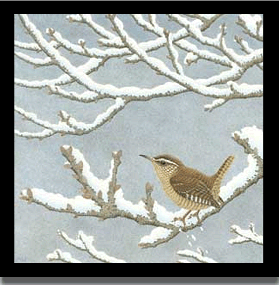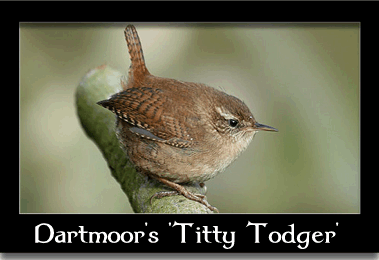
“The robin redbreast and the wren,
God Almighty’s cock and hen.
Him that harries their nest
Never shall his soul have rest.”
“Kill a robin or a wren,
Never prosper, boy or man.”
Titty-todger, ackymal, kitty-lodger, tidley-tope, cracky wran and cuddy bear are all just a few of the three dozen odd names which the wren is known by in Devon along with the commonplace name of ‘Jenny Wren’. It has been suggested that the dialect words about relate to the size of the bird, namely, titty, tidley, cracky. The word ‘cuddy‘ alludes to the bird’s short and erect tail this being another distinct characteristic of the bird, Smith, p.177.
The other grand title which the wren shares with the robin is ‘God Almighty’s cock and hen‘, (the wren being the hen), and sometimes the little bird is called ‘Our Lady’s hen‘. This name stems from the belief that along with the robin, a wren, on discovering a human corpse will cover it over with leaves and moss as a mark of its love for the human race. As a mark of gratitude for this kind act, God or Our Lady therefore bestowed the title upon the bird. Interestingly on Dartmoor and most other places it was considered bad luck to kill a wren or plunder its nest. To do so would invite the wrath of God because the wren, as noted above, was a favoured and sacred bird as suggested in the above verses. Confirmation of this belief on Dartmoor can be seen in the lines below:
“And among children in the country the wren is regarded as little less sacred. The boy who will ruthlessly rob—” strub,” as it is called—the nest of any other bird, will generally respect that of a robin, or a wren, which latter bird he generally refers to as a ” little wranney.” He is proud to tell his companions that he ” knows by a nest,” but if it be that of either of the birds named, the eggs are in most cases allowed to remain, and the little fledgelings to leave in safety. To disturb or injure God Almighty’s birds would bring bad luck.”, Crossing, 1911. p.60
Although the wren has not got such a big association with Christmas as the robin it is still not uncommon to see one appearing on a Christmas card as can be seen below. One reason for this may be the bird’s association with the old tradition of ‘Hunting the Wren’ which occurred on the 26th of December (see below)?

There is also a widespread tradition that the bird carries the title of the ‘King of the Birds‘ and the tale of how it earned that name is pretty well universal. What happened was, all the birds gathered together one day to decide who should be crowned ‘King of the Birds‘. After much debate and squabbling it was determined that whichever bird could fly the highest would gain the title. All the birds fluttered of into the wide blue yonder and one by one they reached their limits until only a very confident eagle remained soaring high in the sky. He looked down as saw that he was clearly the winner and began to declare himself the winner and therefore claimed the sovereignty. However, all of a sudden the little wren, who had cunningly hidden under the eagle’s crest, popped out and fluttered up above the eagle. Triumphantly the little bird chirped as loud as he could; “birds, look up at me and behold your king’. Ever since that fateful day the little wren has carried the title of ‘King of the birds’.
But, that is not the end of the tale because the eagle was well miffed at being cheated of the title and in a fit of temper he grabbed the little wren in his talons, flew back up into the sky and sent the wren tumbling back to earth. The bird crashed to the ground in a cloud of dust and feathers but luckily the only serious damage was done to its ego. However, as a result of its freefall the bird lost part of its tail and has to this day only a stumpy half of a tail.
“Decks my trim fence; in which, by silence led,
The wren hath wisely built her mossy cell,
Shelter’d from storms, in courtly land so rife,
And nestles o’er her young and warbles well.”
John Bampfylde
Polwhele, p.181.
Another name for the wren that occasionally crops up on parts of Dartmoor is that of ‘Bran’s sparrow’, this is thought to stem way back to pagan times when the bird was connected to the old God Bran. It is due to this association that the wren was said to be a messenger of the Gods and would deliver prophecies. Conway, p.195
Despite the solid belief in the sanctity of the wren there was a tradition in some parts of Britain which was in complete contrast and this occurred on ‘Wrenning Day’ which was the feast day of St. Stephen (26th December). The custom involved a gang of boys, known as ‘Wren Boys’, going out and hunting a wren, when found it would then be stoned to death. The poor bird’s corpse would then be taken around the locale in a procession from door to door whilst chanting a rhyme such as the one below, the expectation would be to receive small monetary donations.
‘The wren, the wren, the king of all birds,
Was caught St. Stephen’s day in the furze;
Although he’s little his family’s great,
Then pray, gentlefolk, give him a treat.’
This ceremony was said to mark the fact that when St. Stephen was being hunted by his persecutors he hid in a bush and it was the song of a wren that gave him away thus leading to his capture and martyrdom. Although not originating on Dartmoor or even Devon for that matter there are recorded instances of the ‘Hunting of the Wren’ taking place in the Plymouth area due to the fact that immigrants performed it. In later years the tradition continued but with an imitation wren as opposed to the real thing.
It is also believed that to carry a wren’s feather would give protection against drowning, this belief was commonly found along the coastal ports of Devon but had been heard further inland.

It has been said that the wren is by far the most common nesting bird in the UK and Dartmoor is no exception to this. This tenacious little bird has adapted to all the various areas of the moor from the more gentler climbs of the moorland edges up to the high tors. Back in the 1980s a wren was recorded to have nested up on Foresland Ledge at an altitude of 556.3 metres. When one considers that the highest point on Dartmoor is High Willhays which is the highest point on Dartmoor and towers in at 618 metres, the little bird could not have gone much higher, Smaldon, p.146. However, this adaptability is not necessarily a good thing because one thing that this little bird cannot withstand is cold winters. Severely low temperatures can have disastrous effects on the wren population with mortality rates running up to 99%. As winter approaches and the nights get colder, groups of wrens will gather together in a communal roost often initiated by the dominant male of a territory. They will congregate in such places as under eaves, under ivy clad walls, nest boxes etc. and all the birds will huddle together with their tails facing outwards. The idea of this is quite logical and that is to ‘buddy share’ each others body heat, incidentally, such collections of wrens are known as ‘herds’ or ‘chimes’.
It is during winter that the wren becomes more visible because much of the undergrowth where the bird likes to forage has lost its leaf cover. Usually you can hear the bird before you see it, I love to hear that distinct tch, tch, tch and then trying to spot that tiny brown figure darting and flitting amongst the bushes. Equally it is just as pleasurable to hear the bird’s melodic song on a winter’s morning especially as that time of year is devoid of other bird song.

Conway, D. J. 2003. Animal Magick. St. Paul, USA: Llewellyn Publishing.
Crossing, W. 1911. Folk Rhymes of Devon. Exeter: James G. Commin.
Polwhele, R. (ED). 1792. Poems Chiefly by Gentlemen of Devon & Cornwall. Oxford; Fletcher.
Smaldon, R. 2005. The Birds of Dartmoor. Falmouth: Isabelline Books.
Smith, J. B. 2008. Names for Representatives of the Natural World. Transactions of the Devonshire Association – Vol. 140.
 Legendary Dartmoor The many aspects past and present of Dartmoor
Legendary Dartmoor The many aspects past and present of Dartmoor
